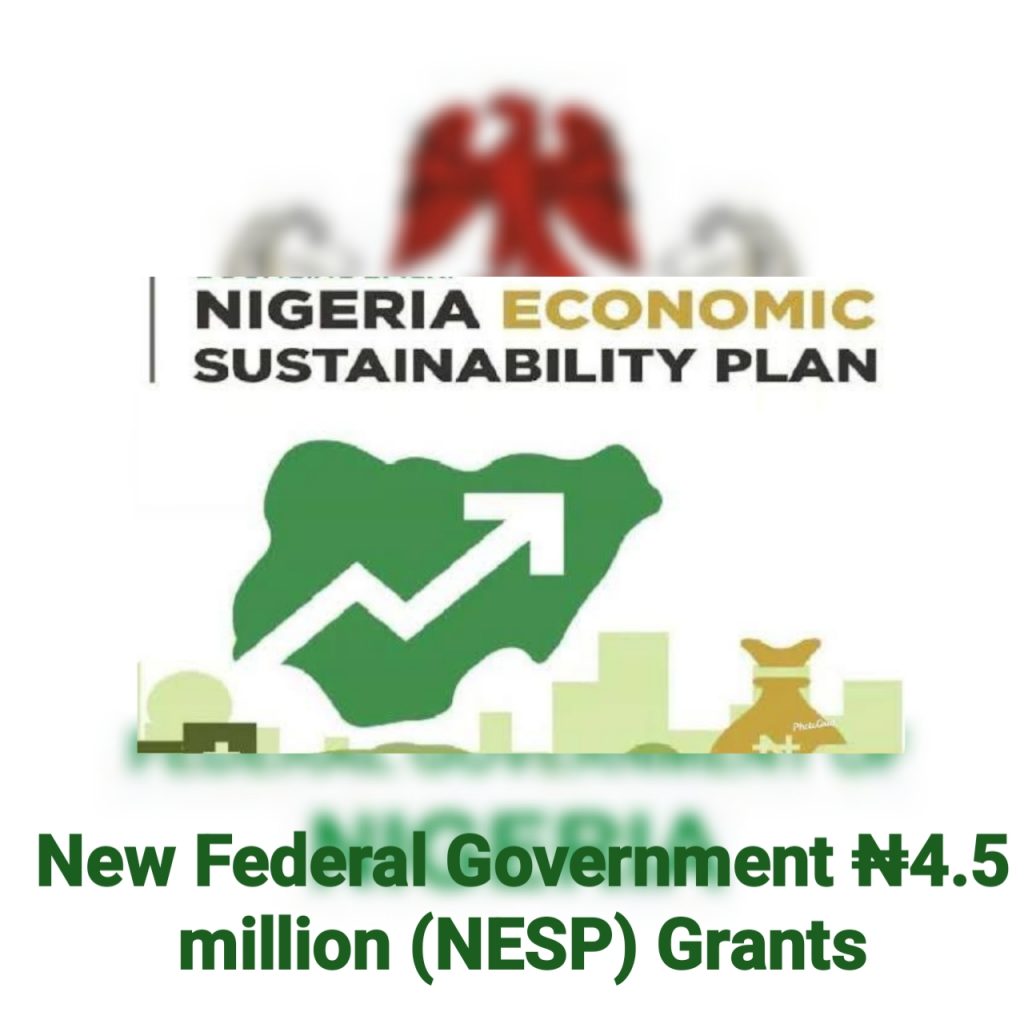How to Apply for New Federal Government ₦4.5 million (NESP) Grants can be accessed below.
Newsonline reports that the Government under the Nigeria Economic Sustainability Plan (NESP) is giving ₦4.5 million in grants to help Nigerians grow their business. Here’s a step-by-step application process for the ongoing Federal Government (NESP) ₦4,500,000 Grant.
This process is simple and fast. Ready for my strategy? Let’s get started:
As part of the Covid-19 recovery strategy, the federal government approved the USD 5.9 billion (NGN 2.3 trillion) NESP to stimulate and diversify the economy, retain and create jobs, and extend protections to the poor.
The Nigeria Economic Sustainability Plan (NESP), approved by the Federal Executive Council (FEC) on June 24, 2020, was developed by the Economic Sustainability Committee (ESC) established by President Muhammadu Buhari on March 30, 2020.
Chaired by Vice President Yemi Osinbajo, the ESC included several cabinet ministers as well as the Group Chief Executive of NNPC and the Governor of the Central Bank of Nigeria (CBN).
Included Terms of Use:
– Development of a plan that responds robustly and appropriately to the challenges of the COVID-19 pandemic
– Identification of fiscal measures to increase public revenues from oil and other oil wells and to reduce non-essential expenses,
– Creation of a recovery plan for the Nigerian economy,
– Articulation of specific measures in support of the 36 States and the FCT, and very importantly,
– Support for MSMEs and job creation.
The NESP was developed in consultation with cabinet ministers, heads of federal agencies, the Presidential Economic Advisory Council (PEAC), state governors, and the National Assembly.
The NESP was developed as a 12-month N2.3 trillion “transition plan” between the Economic Recovery and Growth Plan (ERGP) and the ERGP successor plan currently being developed.
The NESP is funded as follows:
• N500 billion of FGN special accounts
• 1.1 trillion naira from CBN in the form of structured loans
• N334 billion from bilateral/multilateral external sources
• 302.9 billion from other sources of financing
The design and implementation of the NESP are guided by the following principles:
LOCAL CONTENT AND SELF-RESPENCE: The plan encourages local manufacturing, local services, local innovation and the use of local materials in line with the mandate of Presidential Decree 5 of 2017 to promote Nigerian content in contracts and science, engineering and technology, and also based on the mantra of President Buhari “produce what we eat and consume what we produce”.
ECONOMIC STIMULATING: Ensure liquidity, prevent business collapse and avoid the worst effects of a potential recession.
JOB PRESERVATION AND JOB CREATION: The NESP recommends conducting labor-intensive programs in key areas such as housing, roads, agriculture, facility maintenance and direct labor intervention work—all with heavy use of local materials.
PRO-POOR/VULNERABLE FOCUS: The NESP will extend protections to vulnerable groups, including women and people with disabilities. It will also look at economic sectors hardest hit by the pandemic.
STRENGTHENING KEY INTERVENTIONS
Mass Farming Program (MAP)
The plan aims to ensure the cultivation of 20,000 to 100,000 hectares of new agricultural land in each state and to support harvesting and agricultural processing with low-interest loans. This will create millions of direct and indirect job opportunities.
infrastructure
a. Extensive program of public works and road construction
At least 1,000 young Nigerians will be recruited by the local government for the largest public works program in Nigeria’s history, which will represent 774,000 direct jobs. Emphasis is also placed on the construction and repair of primary and secondary roads using locally available materials such as limestone, cement and granite. The roads component will include accelerating and expanding the scope of the Roads Infrastructure Tax Credit Program (RITCS).
b. Mass Housing Program (MHP)
MHP will supply up to 300,000 households annually. Young professionals and craftsmen will organize into cooperative small and medium-sized companies within the construction industry to develop these homes, based on a set of standardized designs. This program will also favor the use of local labor and materials. Doors, windows and other materials are produced, finished or assembled on community construction sites.
vs. Installation of Solar Home Systems (SHS)
This will target 5 million households and serve around 25 million individual Nigerians who are currently not connected to the national grid. Solar system manufacturers need to set up manufacturing facilities in Nigeria to supply the required materials.
D. Investments in health infrastructure
This is done through a special intervention fund and through the use of an existing bank facility.
Eligibility Criteria:
- Applicants under the scheme will be graduates of Nigeria Polytechnics and Universities:
- BSc/HND/ or it is equivalent);
- National Youth Service Certificate (NYSC) discharge or exemption certificate;
- Not more than ten years post-NYSC
Application Requirements:
- A registered business name
- Your Business Registration Number ( RC or BN)
- State in which the business operates
- Type of Business
- Age of Business(Number of years of operation)
- Phone Number and your government name
APPLICATION METHOD.
Interested Persons, should kindly apply below.
